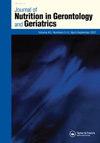Social Relationships, Food Security, Protein Intake, and Hospitalization in Homebound Older Adults: A PATH Analysis
Q3 Medicine
Journal of Nutrition in Gerontology and Geriatrics
Pub Date : 2022-06-15
DOI:10.1080/21551197.2022.2084203
引用次数: 0
Abstract
Abstract The objective of this study was to measure direct and indirect relationships between food insecurity (FI), protein intake, social relationships, depressive symptoms, and their impact on hospitalization among home-delivered meal (HDM) recipients, compared to controls, using structural equation modeling. The analysis used data from the National Outcomes Evaluation Study (2015–2017) of the OAANSP. HDM recipients’ mean usual protein intake was significantly higher than controls, but both groups had mean intakes below recommendations. Eating alone was inversely associated with lower protein intake and greater hospitalizations in controls. FI, prevalent in 25.1% of HDM recipient and 16% of controls, was associated with lower protein intake in both groups. Receiving instrumental social support was directly associated with lesser severity of FI in recipients. and more depressive symptoms only in controls. HDM recipients and controls may be at high risk for protein insufficiency, underscored by high prevalence of FI.社会关系、食品安全、蛋白质摄入和居家老年人住院:一项PATH分析
本研究的目的是利用结构方程模型,与对照组相比,测量在家送餐(HDM)接受者中食物不安全(FI)、蛋白质摄入、社会关系、抑郁症状及其对住院治疗的影响之间的直接和间接关系。该分析使用了OAANSP国家成果评估研究(2015-2017)的数据。HDM接受者的平均蛋白质摄入量显著高于对照组,但两组的平均摄入量均低于推荐摄入量。单独进食与对照组中较低的蛋白质摄入量和较高的住院率呈负相关。FI在25.1%的HDM受体和16%的对照组中普遍存在,两组中都与较低的蛋白质摄入量有关。接受工具性社会支持与受者FI严重程度较轻直接相关。只有对照组才会出现更多抑郁症状。HDM受体和对照组可能存在蛋白质不足的高风险,这一点由FI的高患病率所突出。
本文章由计算机程序翻译,如有差异,请以英文原文为准。
求助全文
约1分钟内获得全文
求助全文
来源期刊

Journal of Nutrition in Gerontology and Geriatrics
Nursing-Nutrition and Dietetics
CiteScore
2.20
自引率
0.00%
发文量
13
期刊介绍:
The Journal of Nutrition in Gerontology and Geriatrics publishes original research studies that are directly relevant to clinical and community nutrition issues that affect older adults. Epidemiologic and community-based studies are suitable for JNE, as are well-controlled clinical trials of preventive and therapeutic nutritional interventions. The Journal of Nutrition in Gerontology and Geriatrics invites papers on a broad array of topics in the nutrition and aging field, including but not limited to studies of: preventive nutrition, nutritional interventions for chronic disease, aging effects on nutritional requirements, nutritional status and dietary intake behaviors, nutritional frailty and functional status, usefulness of supplements, programmatic interventions, transitions in care and long term care, and community nutrition issues.
 求助内容:
求助内容: 应助结果提醒方式:
应助结果提醒方式:


